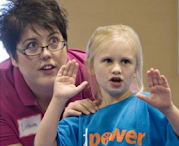By Guest Blogger Annika Prager, Go Girls!
 |
| Annika Prager, GoGirls! |
Thank you to Kidpower Teenpower Fullpower International for permission to use portions of their exceptional safety and empowerment programs in this post and in GoGirls programs. Kidpower is the global nonprofit leader in ‘People Safety’ education – an international movement of leaders reaching millions of people of all ages, abilities, genders, identities, and walks of life with effective, culturally-competent interpersonal and social safety skills. To learn more, visit https://kidpower.org
Here are some tips on how to use all the Kidpower safety powers that we've taught this summer at Go Girls! at Home to help with the Back-To-School transition.
KIDPOWER FOR BACK-TO-SCHOOL
This Fall you may be meeting with youth participants on Zoom or Google Classroom or maybe the program is engaged in hybrid learning (a mix of online and in-person). No matter what your Back-To-School plans look like these tips will help youth stay safe and have more fun this fall!
Calm and Confident Bodies: Paying attention to Zoom or Google Classroom can be so challenging. Doing school and afterschool from home is not as easy as it may sound. If your youth are anything like me, they probably find themselves getting distracted by every little thing. This is a time when they can use Calm and Confident Bodies. Calm and Confident Bodies means sitting upright with a straight back and head held high. It also means taking a deep breath when they need it. Invite your participants to try to return to their Calm and Confident Body when needed.
 |
| Source: Kidpower |
Awareness Power: Awareness Power means being “aware” of your feelings! It can mean being aware of how your body, mind, and spirit are feeling. During online learning, you can invite your youth to use this power to help them notice what their body needs. Maybe they need a break? Maybe they need to stand up and stretch? Maybe they need help from a grown-up because their Zoom screen froze? Only they know what they need. At GoGirls Camp, we teach our participants that they have the power to ask for help when they need it.
Mouth Closed Power: When we are in-person, or sometimes even over video, Mouth Closed Power is a reminder to press your top lip against your bottom lip. This power can help youth remember to only speak when it is their turn. It can also help them pause and not say mean words that will make a problem bigger. Mouth Closed Power can even help them remember to take a breath and return to their Calm and Confident Bodies. But what does all this have to do with Back-To-School in a pandemic? Easy! Mouth Closed Power is that little button on the bottom of the screen that says “Mute/Unmute.” They can use this Zoom or Google Classroom feature in all the same ways they would use Mouth Closed Power in-person!
STOP! Power: We always have the power to say “Stop.” From wherever they are, youth can practice building a fence with their hands and saying stop. Beautiful! STOP! Power is perhaps the most powerful of all powers! Instructing your youth to use a loud and proud voice will ensure that others know to bother them less and believe them more. Just because they may be social distancing or distance learning does not mean that their powers are weaker. In fact, they are more important than ever. You can remind your youth participants they have the power to say “STOP,” they have the power to say “Please stop I don’t like that,” and they have the power to say “Stop or I will ask for adult help!”
 |
| Source: GoGirls Camp! |
Walk Away Power: Last but not least, your youth can still use their Walk Away Power even when distance learning. Walk Away Power means getting the space they need when a safety problem arises. It can mean literally moving out of reach or it can mean turning off their camera or the chat feature to distance themselves from a safety problem. Remind youth they always have the power to ask help from an adult.





No comments:
Post a Comment